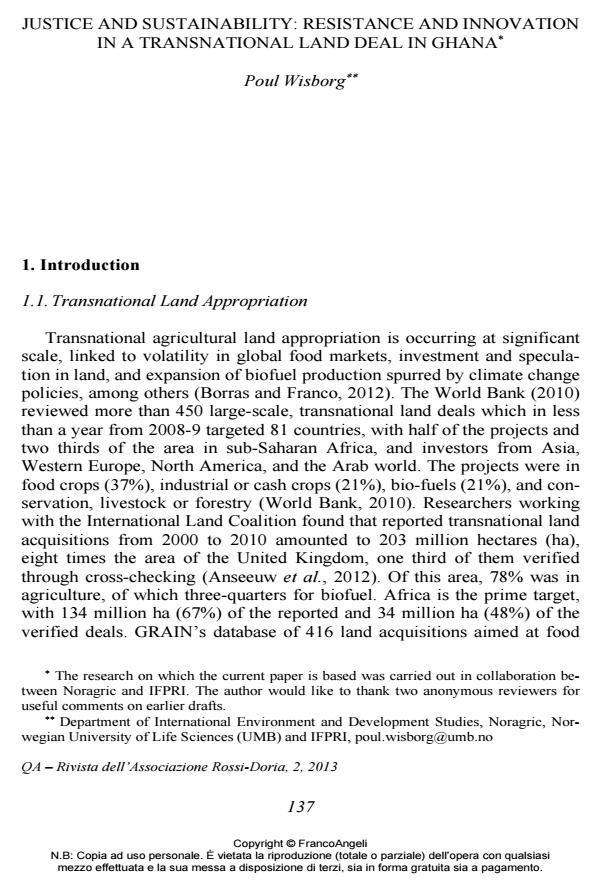Justice and Sustainability: Resistance and Innovation in a Transnational Land Deal in Ghana
Journal title QA Rivista dell’Associazione Rossi-Doria
Author/s Poul Wisborg
Publishing Year 2013 Issue 2013/2
Language Italian Pages 26 P. 137-162 File size 466 KB
DOI 10.3280/QU2013-002006
DOI is like a bar code for intellectual property: to have more infomation
click here
Below, you can see the article first page
If you want to buy this article in PDF format, you can do it, following the instructions to buy download credits

FrancoAngeli is member of Publishers International Linking Association, Inc (PILA), a not-for-profit association which run the CrossRef service enabling links to and from online scholarly content.
Resistance and social innovation shape the outcomes of transnational land grabbing in terms of justice and sustainability. This paper examines a case of appropriation of land in southern Ghana. The resultant environmental effects and the loss of farmland triggered resistance, particularly after a shift from biofuel to large-scale food production. Resistance induced the company to seek "operational peace" by paying compensation to those who lost farmland and trying to improve its local relations. The case exhibits both resistance to land appropriation and some modest steps towards social innovation, though not adequate to address social justice issues linked to land, labour, gender, and the environment. Understanding the dynamics of resistance and innovation is helpful in addressing issues of social justice and sustainability involved in transnational land grabbing). EconLit Classification: 0130, 0310, P480, Q150, Q560
Keywords: Appropriation, Agriculture, Ghana, Gender, Human rights, Innovation and invention, Land, Norway, Resistance, Transnational, Political economy, Legal institutions, Land ownership and tenure, Environment and development
- Land governance and access dynamics in Sekondi-Takoradi, Ghana Ernestina Ohenewaah Denchie, Austin Dziwornu Ablo, Ragnhild Overå, in African Geographical Review /2021 pp.364
DOI: 10.1080/19376812.2020.1831560 - Imageries of the contested concepts “land grabbing” and “land transactions”: Implications for biofuels investments in Ghana Festus Boamah, in Geoforum /2014 pp.324
DOI: 10.1016/j.geoforum.2013.10.009
Poul Wisborg, Justice and sustainability: resistance and innovation in a transnational land deal in Ghana in "QA Rivista dell’Associazione Rossi-Doria" 2/2013, pp 137-162, DOI: 10.3280/QU2013-002006